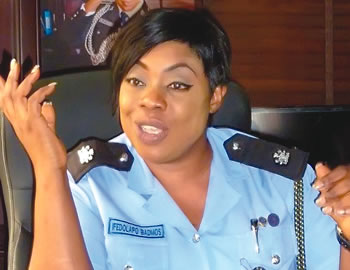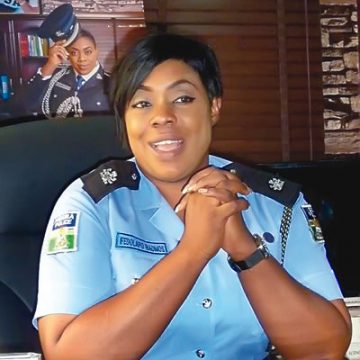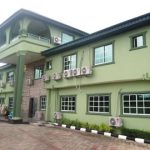Nigerian Tribune quartet of LANRE ADEWOLE, OLALEKAN OLABULO, ELLIOT OVADJE AND OPEYEMI OWOASEYE engaged Lagos Police Public Relations Officer, (PPRO), Dolapo Badmos, a Superintendent of Police, (SP) on sundry security and personal issues.
With your great looks and physical appearance, you will fit into any other profession anywhere in the world, why the police uniform?
I am flattered, thanks for the compliment. I am glad I came into one of the noblest professions in the world because ordinarily policing is the best job. I will say it and I will stand by that because you are like a guardian angel; you put your life on the line to take care of others. When there is armed robbery, you are the first point of call; when you are celebrating, you still want to be protected, you still call on the police.
How did you come to that decision; what inspired you?
Let me tell you that I had never wanted to be a police officer. I never thought of it. While I was growing up, I wanted to be a doctor because I would be able save life and I will be the first person to attend to them when someone is in distress; but as God would have it, I didn’t become a doctor. But I think policing is another form of protecting and saving lives. And it’s not out of place. I think within me, I still feel like a doctor.
And how did I find myself being a police officer? I have an uncle who had wanted to be a police officer right from his university days, and he didn’t have the opportunity. He applied, he did everything. And during my service year, he said why don’t you join the police? I asked him not to go there. He went ahead to obtain the form and started pushing me to go for the interview.
At the last interview that I went for, the AIG there told the woman beside him that “I think she has a nice figure for the job”. Immediately I sat down, he didn’t even ask too many questions. The woman who was the commissioner of police had my kind of physique and she said, “I think it is our stature that God thought about when he wanted to create policing job, and don’t forget, police was the first job that God created.” Since that day, I knew I would be employed. Well, I must admit the way it was, it was like a mixed feeling.
I am so grateful to the leadership of the force that they are doing everything to ensure that we conform to international standards of policing.
Your last assignment before you were appointed as the police PRO was as a DPO. How have you been able to work effectively and efficiently considering the fact that you have not worked in the public relations department of the force before?
Well, whether it is efficiently or not, it depends on you to judge. But I think I am giving in what I can tag my best. It depends on how you view it. To some, we are not doing enough; but to some we are doing the best. What actually helped me was that I have been on the field as an operational officer. I didn’t study Mass Communication and I have never been in the office of the PPRO. I want to say I thank God Almighty for His grace because it is tasking. But by the grace of God, and His wisdom, we are coping.
I am going to take you back a little bit, you cut the image of the ideal tough cop, have you always been like this even from your youthful days?
There is one thing about the police: if you think you are the softest person in this world, if you are feeble, if you are not strong, policing can make you strong. And if you think you are the toughest in the whole world, if you think nothing can break you, policing can break you. So you can always strike a balance when it comes to policing. In my own case, growing up, I was always the soft type. There was a training we went for at Goza in Borno State; there is this place that is called a place of no return, it is a place you are brushed up if you are weak in order to get you ready for the job. If you go to Goza, they will tell you this is a place of no return, you are not returning and you must do what we do here. When I got there I said that if I can’t return, then I must do what they do there. I will rather cope. I made up my mind that I am going to cope. When challenges were coming, I was like I can’t go back here, you need to brush up. You need to wake up. And I think it helped me because I used to think I was very weak. My training through the academy at the police mobile training has actually brushed me up.
What is the latest development from the police angle about the cases of abduction, raping and stealing of property by the militants in Igando and Ikorodu communities?
Let me quickly tell you that these boys are pipeline vandals. You are aware of their activities at Ibafo and Arepo in Ogun State, until the Federal Government, police force and every other security agencies decided to take charge of the pipeline. What they do now is what we call soft target; they just go for their soft target and leave. They are just using the opportunity to tell the government that well… if you think we cannot do vandalism, we are still here. These are a group of people who are already criminally-minded. And at all cost they want to exhibit their criminality. We have been arresting them. Investigation shows that most of them are Ijaw, Arogbo, because from two of the arrests that we have done, they are from riverine areas. That is why they categorise them as militants. Whether they like it or not, it is going to be a thing of the past. You are aware of bank robberies in Lagos before now, but now they can’t access it. They are just using the opportunity that those places are close to rivers: two minutes they are on ground, in another two minutes they are on water. Especially Isawo, Igbo-olomu, they are close to the river. They are only capitalising on that, but very soon, it will become a thing of the past.
It appears the Lagos state police command is helpless in cases of extra judicial killing that had to do with sister security agencies. There was a time a soldier killed somebody in Badagry, there was a time an official of the civil defence corps killed somebody in Festac; an airport officer killed somebody in Apapa, there are many cases like that. And till today, none of them have been arrested. Why have the police been helpless in handling those cases?
The police can never be helpless in doing their statutory duties when it comes to extra judicial killing by sister agencies. But like you said, you said sister agencies, they are also agencies. Even if a police man kills, you can’t grab him and take him to court, he must be dismissed first before he faces the offense he has committed. If a soldier kills and we find him there, we will arrest him. If an official of civil defence kills and we meet him there, we will arrest him. But people from sister agencies kill and go back to their organisation, but they can’t give us the identity of these people. Does it mean we will go and arrest every soldier we see on the road? Do we arrest every civil defence officer we see on the road? It doesn’t work that way.
There are some of them with known identities.
When they are known and we see them, what we do is to write to the authority, then the authority will release them. We cannot go to the army barracks to arrest them. There are procedures, ways and manners that are followed.
The civil defence case in Festac that you just spoke about, till tomorrow our command is still writing to them to produce him. About two weeks ago, we still wrote to them to produce the person that did that, but they are not producing. Does it mean we will go and barge in on them and arrest them or their commandant? No. We will continue to follow the procedure.
But isn’t that a kind of double standard? If it’s a member of the public, you can move in with arrest warrant and get the person arrested.
There is nobody that can issue arrest warrant against a serving member of any force. They are also an organization on their own. If a police man has killed, what we do in our organisation is to bring the police man out, subject him to investigation, then he goes through disciplinary action, and then we charge him to court. Most times this does not even last more than 48 hours, under 24 hours we are done. We impress it on those organizations to do such; if a civil defence person killed, impress it. But members of the press always like to hit police hard.
Let’s talk about your time with the former speaker of the House of Representatives. How was it working with Hon. Patricia Etteh?
Well, in the whole federation and the entire police force up till today, I am the first female ADC to a number four citizen in the nation. I don’t think it has happened again because we haven’t had any woman occupy first, second, third or fourth citizen positions since then. So I think it’s a great opportunity and working with her was perfect. I was professional all through and it really paid off while she was there. One thing I caught also with her was that, she is a strong-willed woman.
Corruption does not just start like that, no one can just come to you and say let me give you something so that you will kill this case. They first look at your body language, when it shows that you are ready, then they bring it. I don’t give a body language that encourages that, I don’t give room.
You got married as a police officer, I know it’s not every time a civilian will walk up to a uniformed lady. How easy was it for men to access you before he eventually came asking and stayed?
Honestly, from my own experience, if I were not a police officer, I wouldn’t have had many suitors coming my way the way I had them. Some people will say it›s because I have been occupying boss level right from day one. But I can tell you, most civilian men want security, so they love police officers.
So they were all coming?
Yes, and I needed to call on God to get the best and I got the best.
Were they all civilians?
Officers, civilians, military, from everywhere.
Don’t you think it was all about your looks; maybe the rest were not so fortunate to have your kind of looks.
No matter how a woman looks like, you will always get someone who will want to have you as wife. Well, maybe my look had also helped but that is with all sense of modesty.
How much of police woman do you take home every day for your kids and hubby?
The only part of policing I take home is discipline because policing entails being disciplined, and for you to be disciplined, you also have to give it to your offspring. I got it from my mum, I am giving it to my children and I think it’s still going to continue from generation to generation. Another side of policing that I take home is to be alive, when I am at home, when my child screams, I must get there in the next five or ten minutes, because I must ensure the child is safe. And that is also part of policing, when there is an alarm somewhere, you rush there. But, police detain. Who does police detain? Suspects. My children are not suspects. I don’t take home the duty of detaining.
There must be aspect of this job that your hubby will definitely do not like.
I think he likes everything about my job.
Including duty calls?
He is so supportive. When my phone rings, he brings it to me saying that I think they need you. He reminds me about duties, he marks the calendar for me. When I tell him I have meeting as early as 6am, by 5am he would have woken me up. He is such a caring person.
In the course of your policing career, have you at any time thought of leaving the job. If yes, can you share one or two of those experiences with us?
Honestly, God has been faithful and good to me. I have never had any cause to think I want to leave the job. You cannot say it’s been all smooth. Going through the mobile police school has prepared me such that when you have any challenge, face it, and you will succeed. It’s not that I have not faced one or two challenges in the force, but I will always face it and will scale through.
Till today, what has been your greatest achievement as a police officer
There is this market that I was in charge of in Abuja. They call it Garki Model. I was the officer in charge, and it’s under Garki division. There was a case of adulterated baby food in the market, and there was a complaint. Having the matter coming to me, we started investigation and discovered that it was a group of people that was adulterating it because we were able to nab one of the suspects who was supplying them. Investigation also revealed it was Trade Fair market in Lagos that they did the packaging. We wanted to extend our investigation; what we discovered was that they were saying that we should not come, because that place was very volatile. From all indications, they said it was a very tough area. I told my DPO that I was going to go. I left with my IPOs, we came to Lagos. Successfully, we arrested them; even the people in the market helped us to get a taxi to bring the suspect, because we used investigation tactics on them. It was when we got to the division where we wanted to keep the man that they discovered he was under arrest. We took him to Abuja and we were able to prosecute him in conjunction with NAFDAC. I think the man was jailed, so till today, my boss usually says that I am strong to be able to arrest him from that place.
How do you manage information through the public, knowing full well that some may be propaganda?
Information cannot confuse us, because what we do is investigation. It’s only people out there that information can confuse because they don’t have any means of investigating whatever they hear. There is something we call process of intelligence gathering. For us to deal with any information there must be a sort of intelligence gathering. And there are processes of gathering intelligence. There must be information. Then you process the information, you filter the information. During the process of filtering, you will know if it occurred or not, then you pass it back to the society. As a seasoned and professional police officer, information should not confuse you because there are processes.
While you were in school, you studied accounting. Do you still have any intention of going back to practice accounting?
I am an accountant by training; I am a police officer by profession. But good enough, at the officer level, police employ graduates. At a point in time, your professionalism might be needed because we have so many sections in the force. If you are a graduate of law, at a point, you might be needed in our legal department. We also have our budget department, at a point, they might ask who should be who in the budget department; then they might look for an accountant, so you will fit in there. It doesn’t matter what you read but what you read might be needed.







